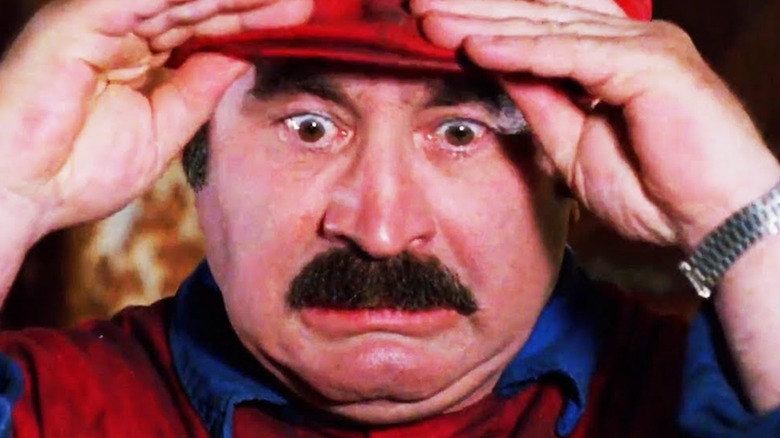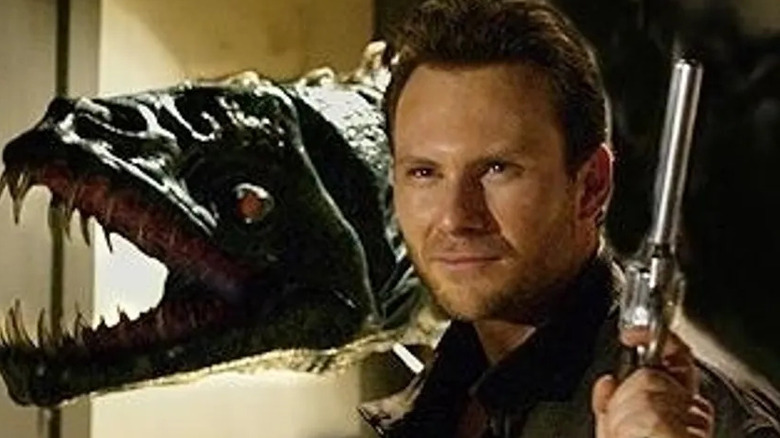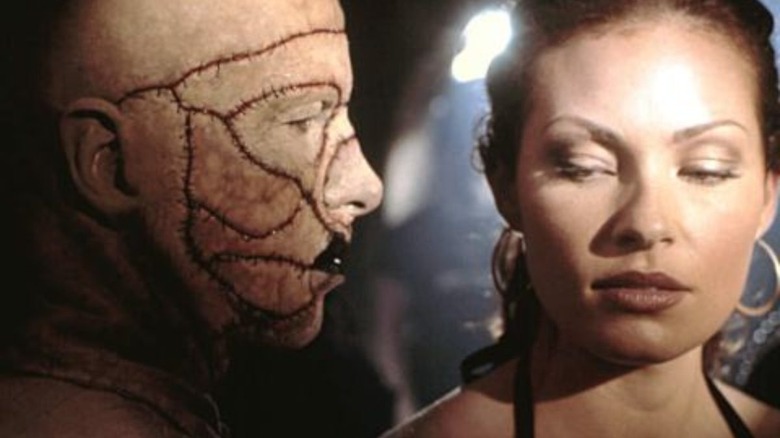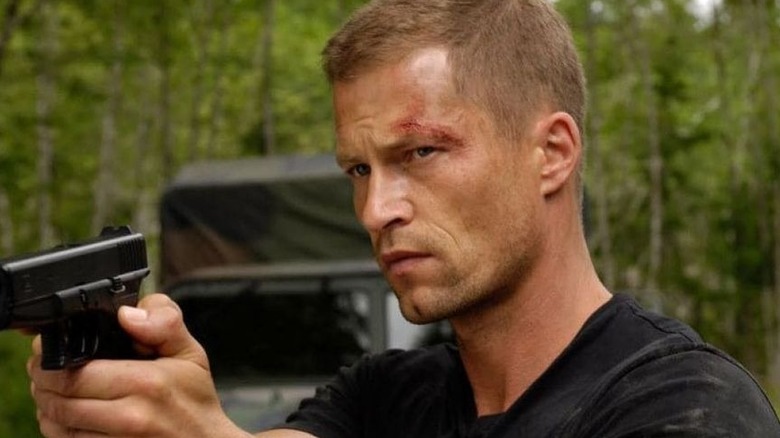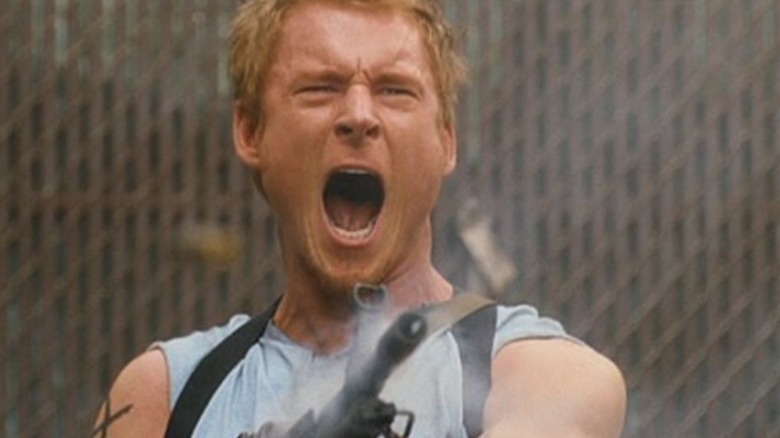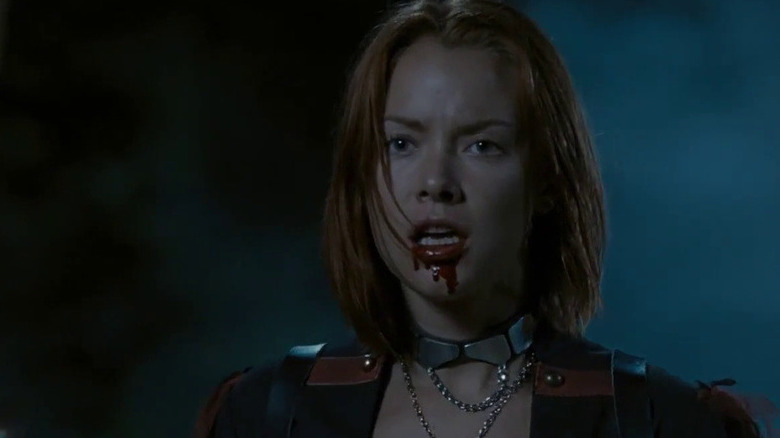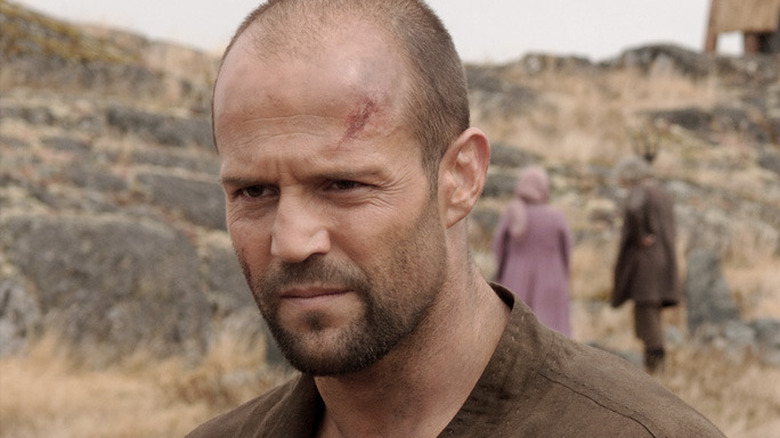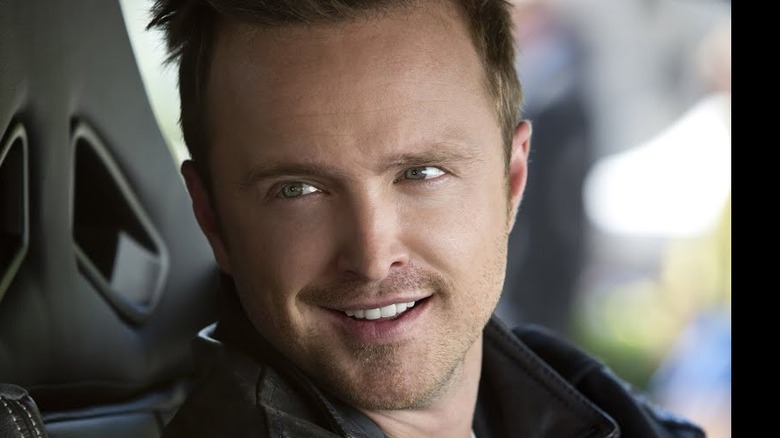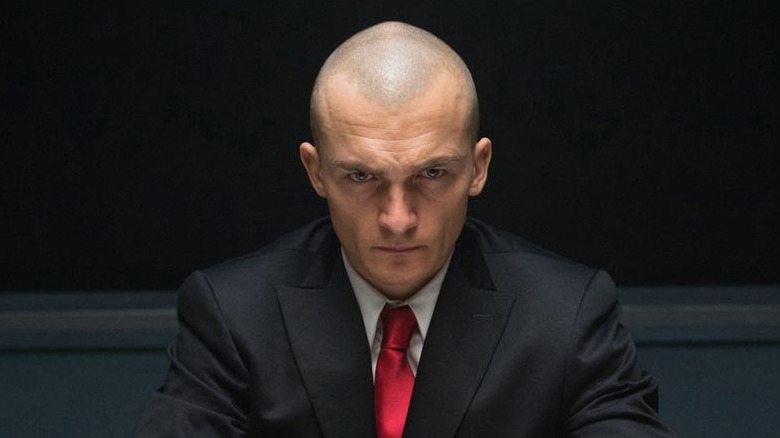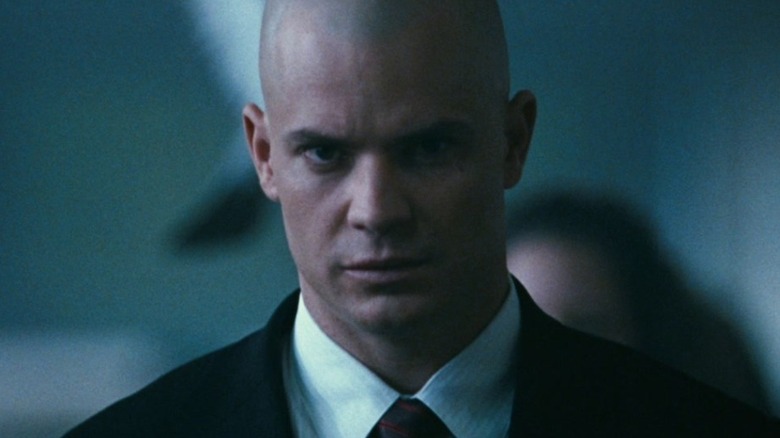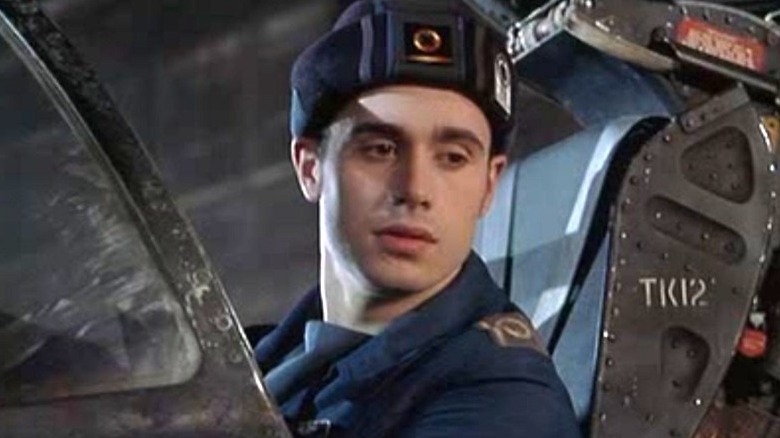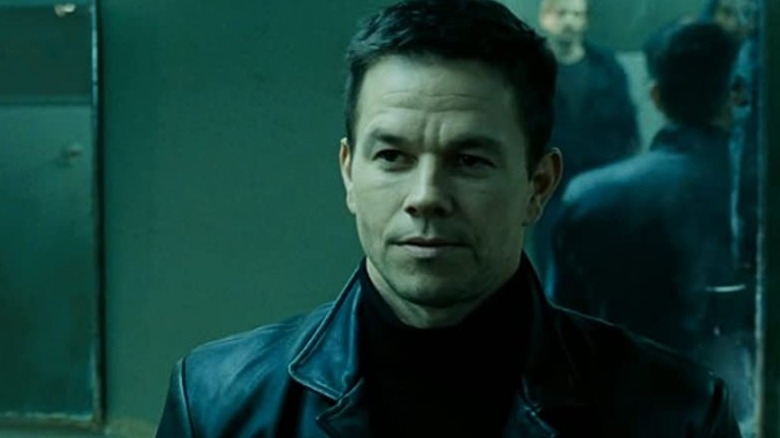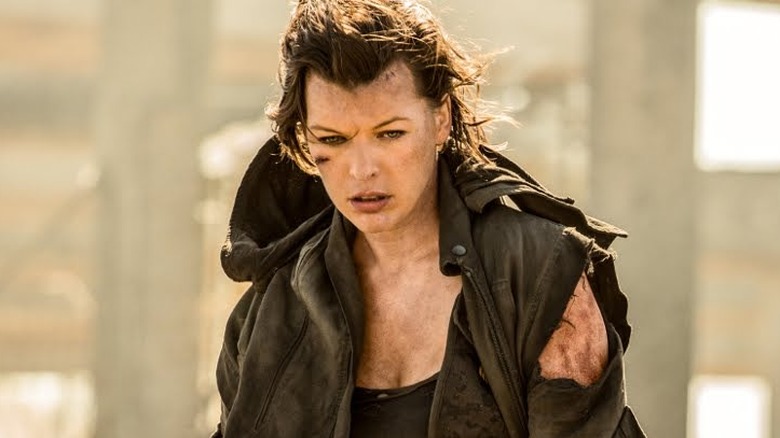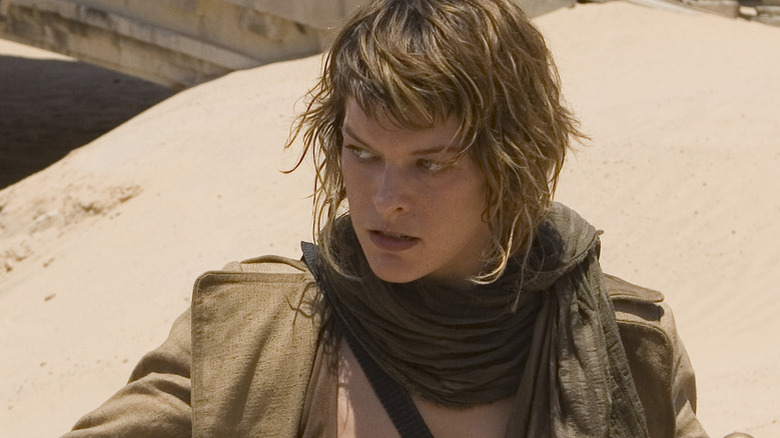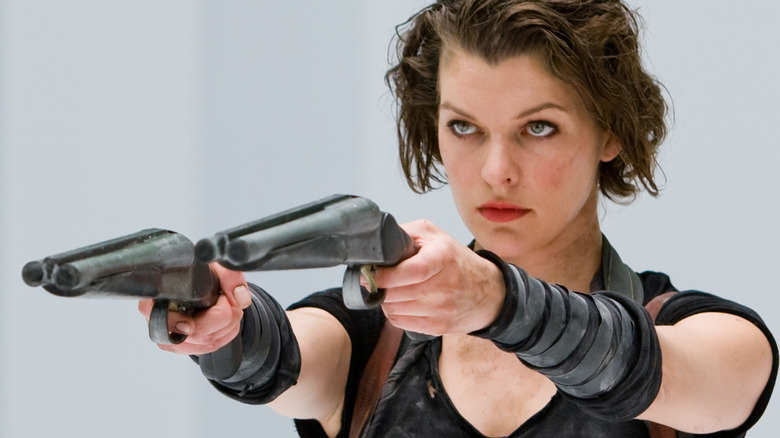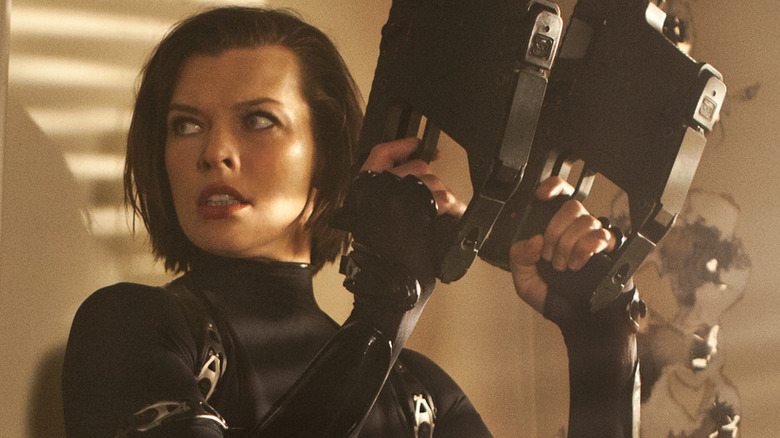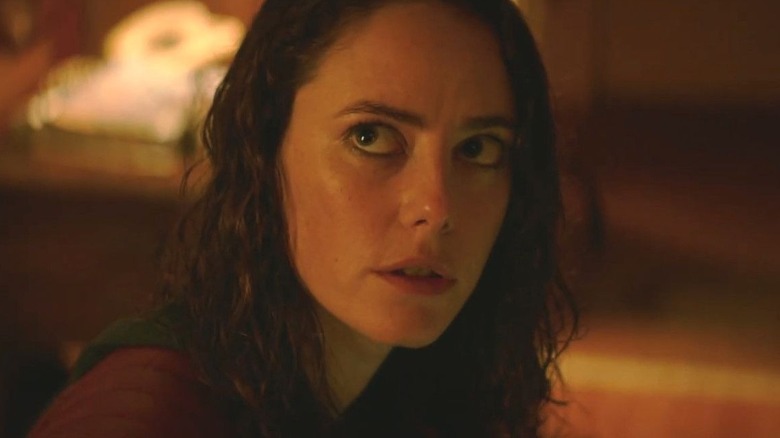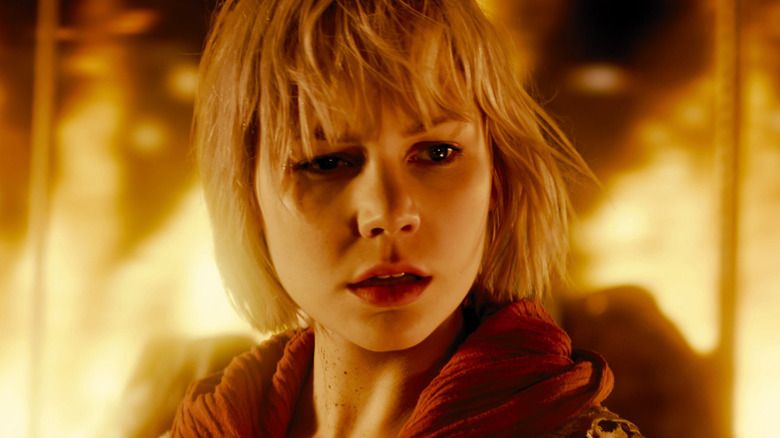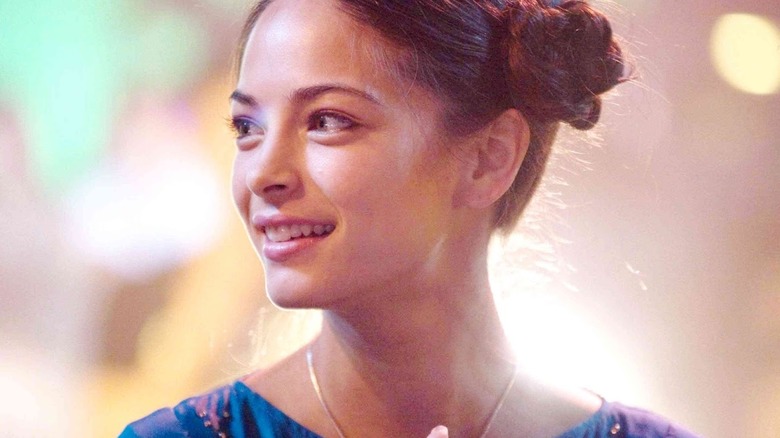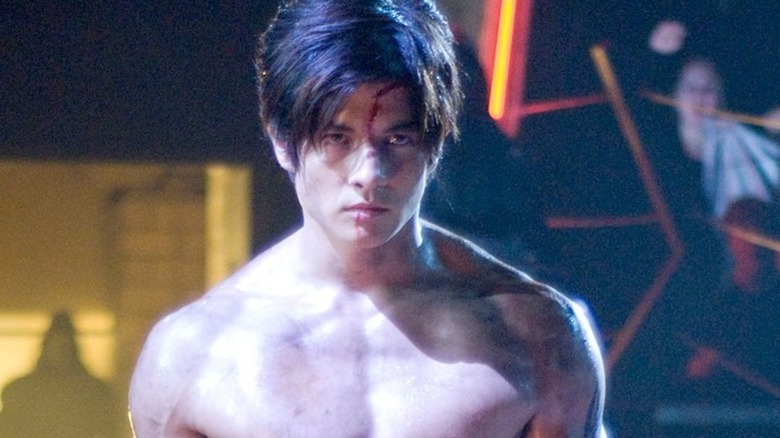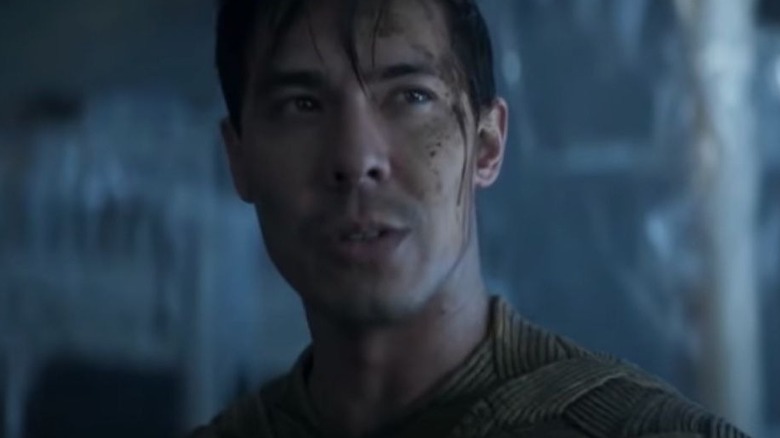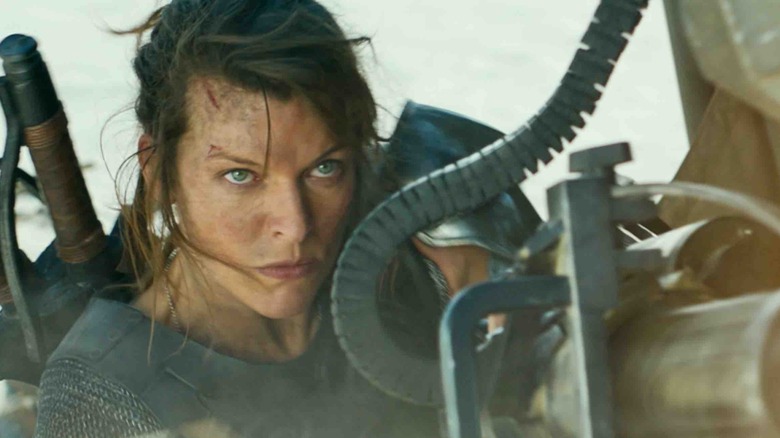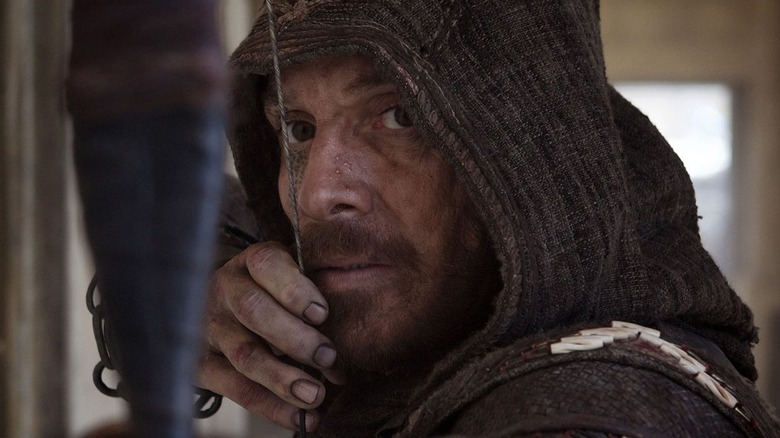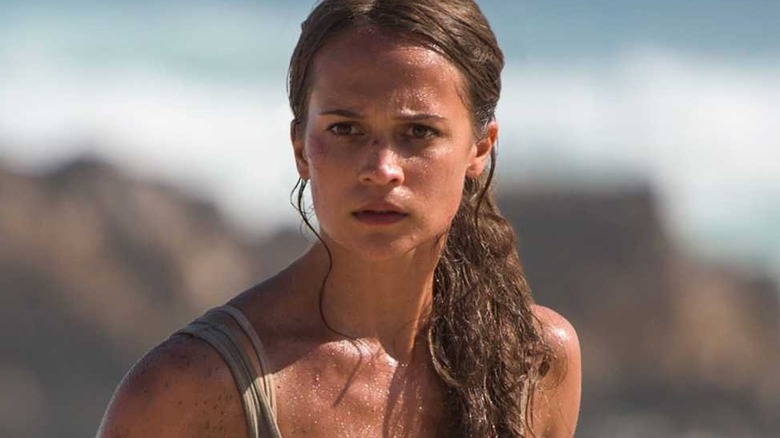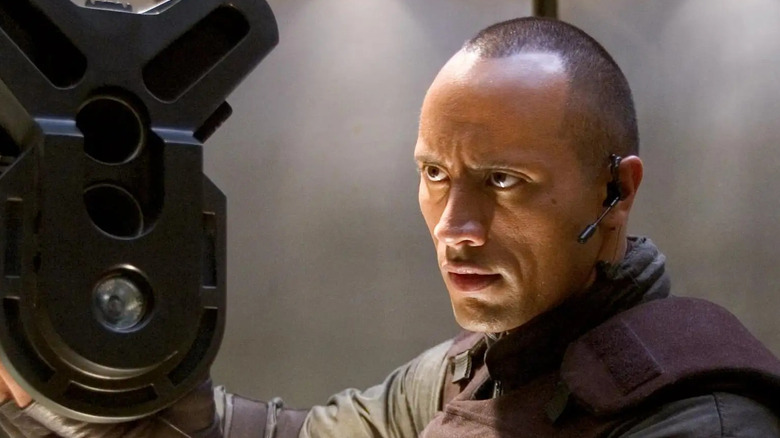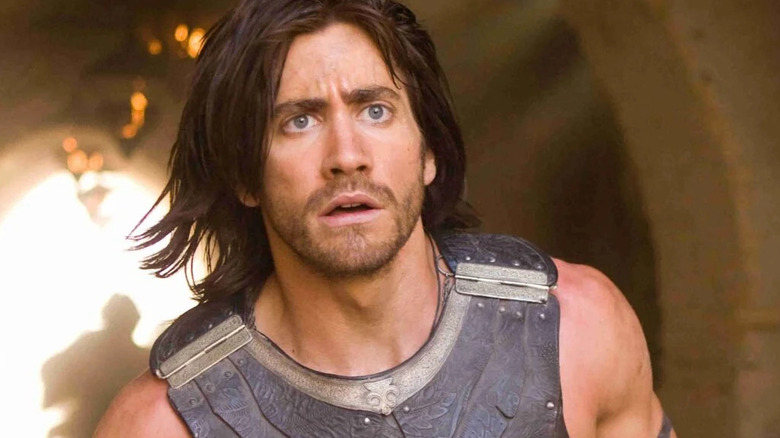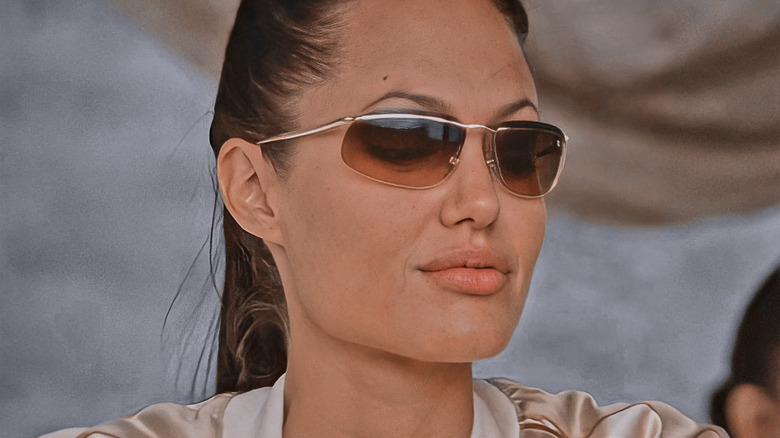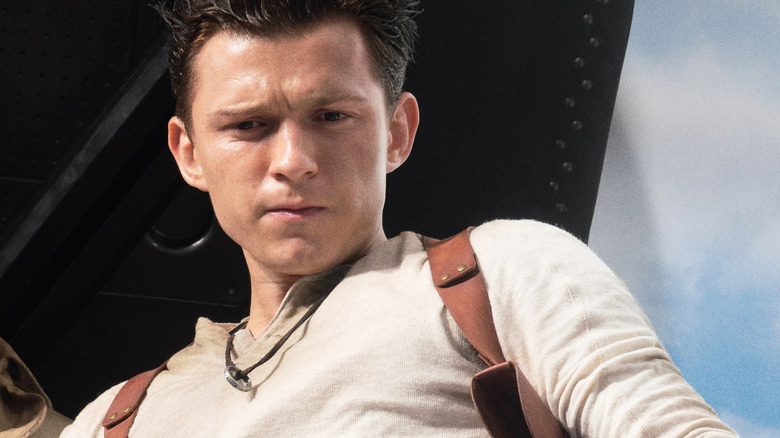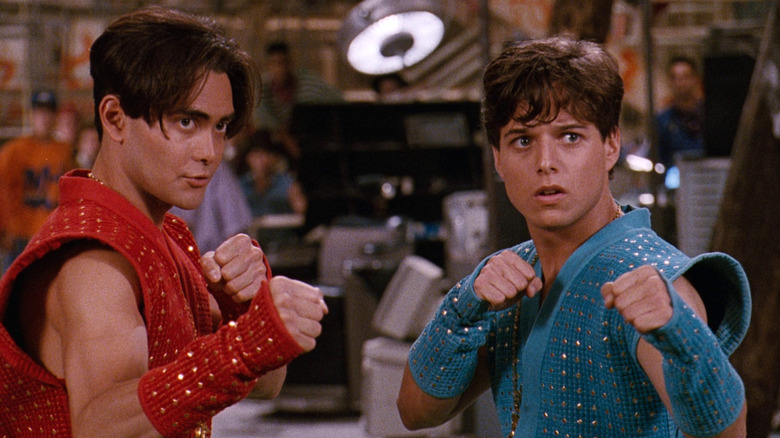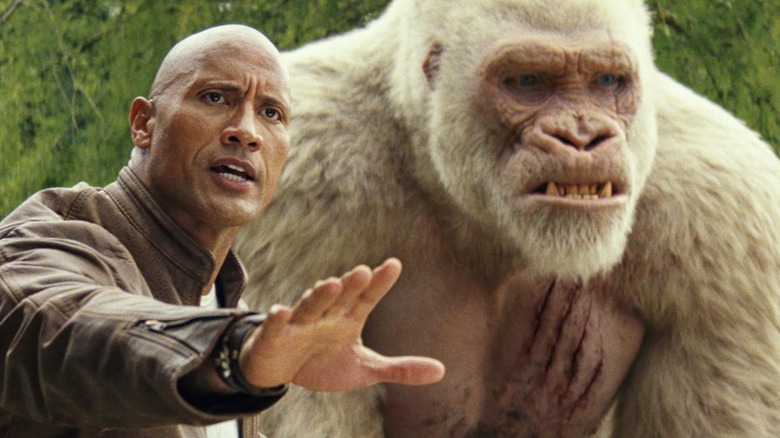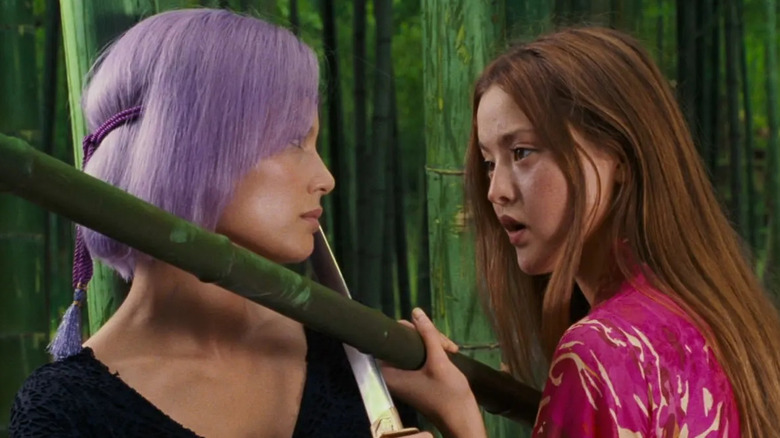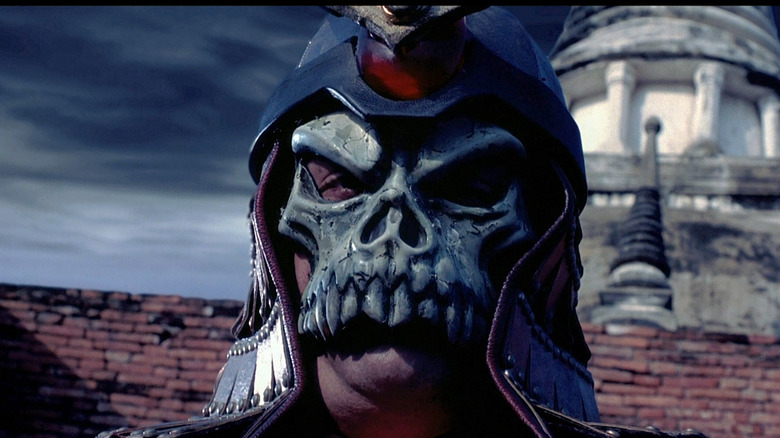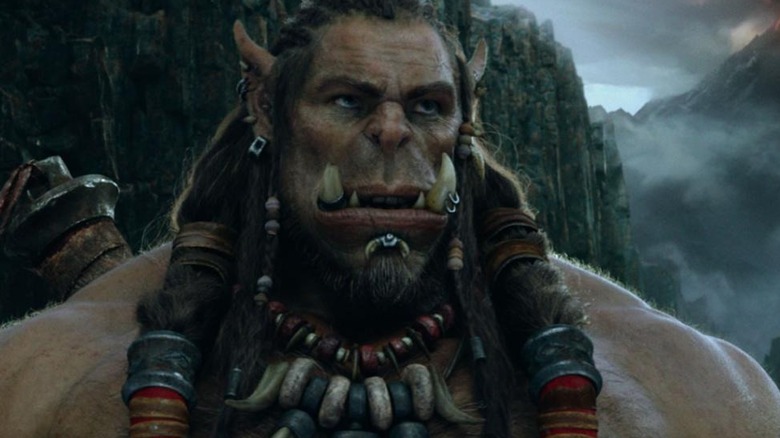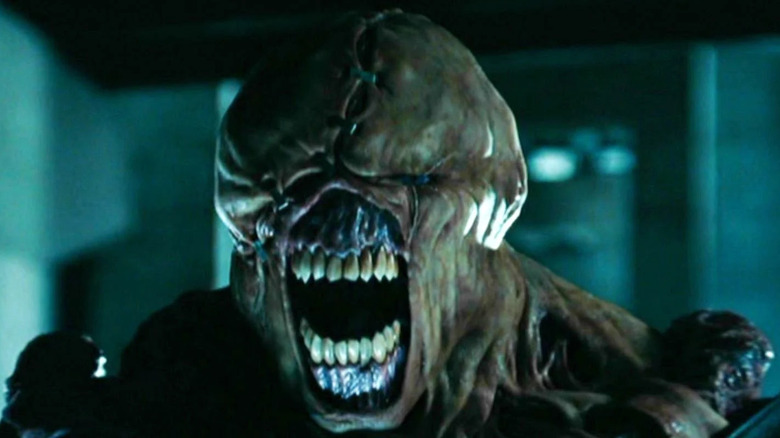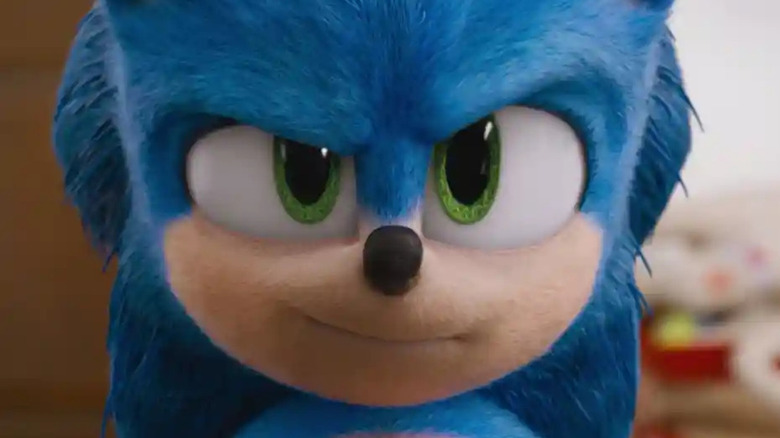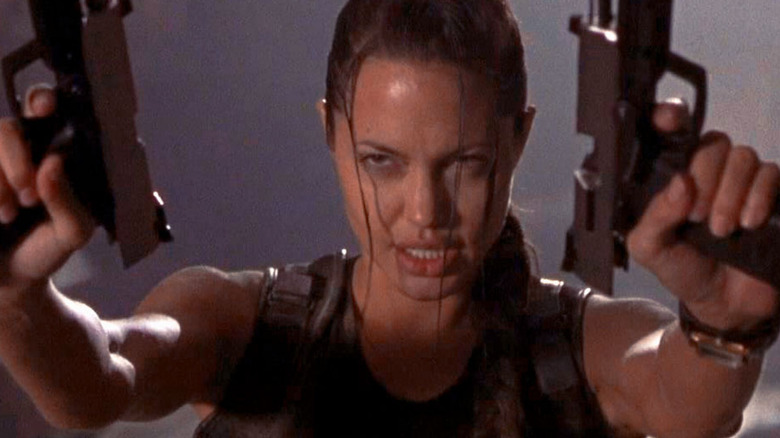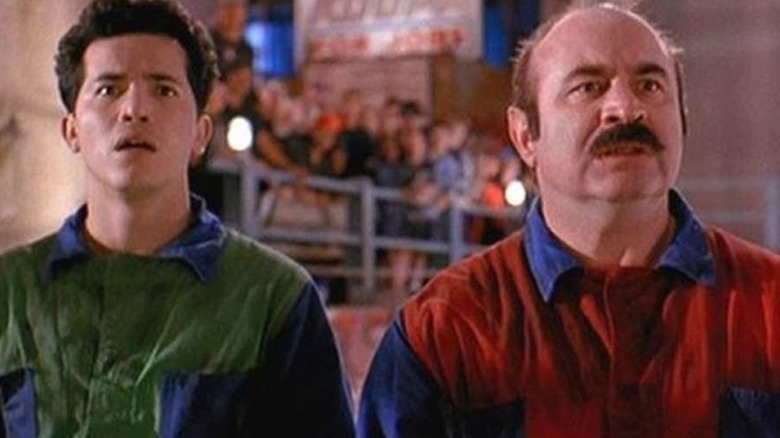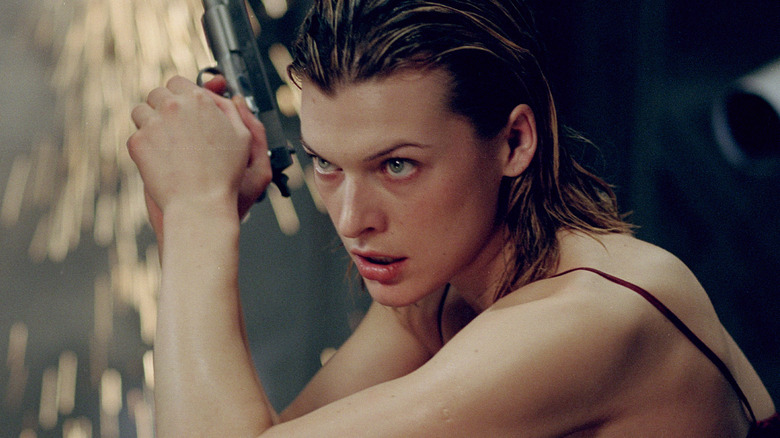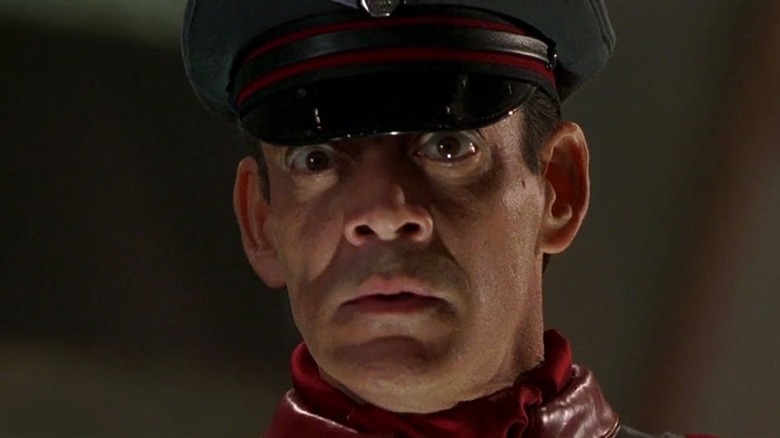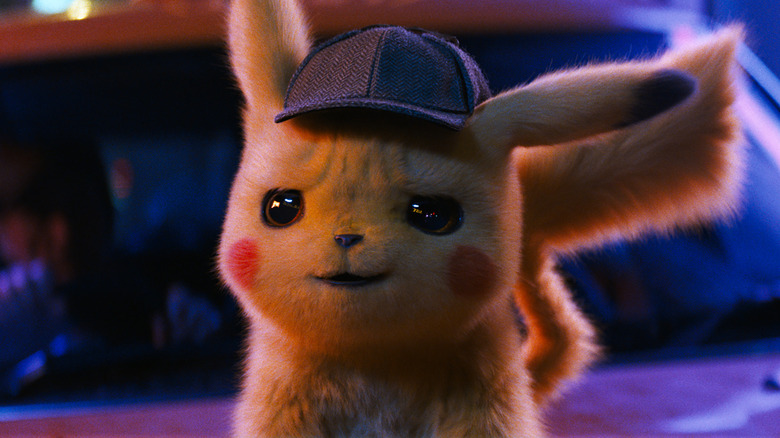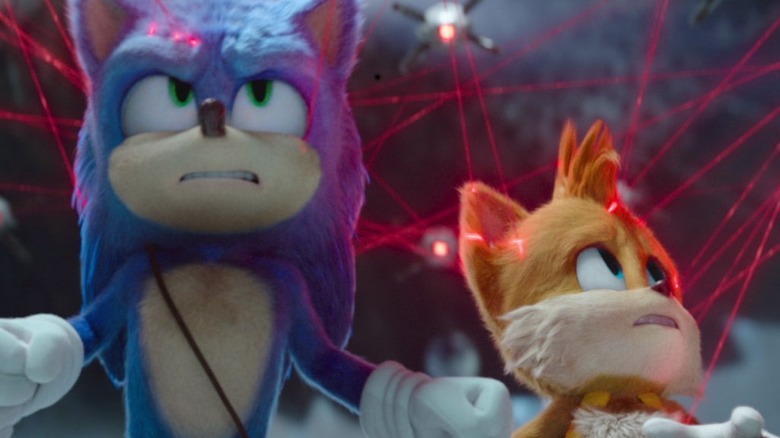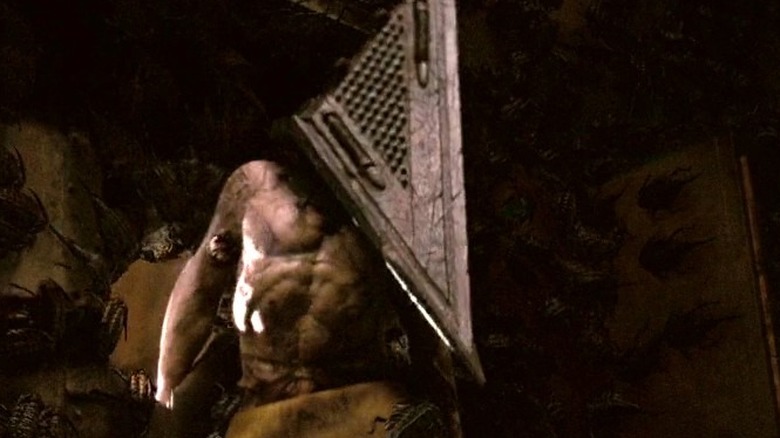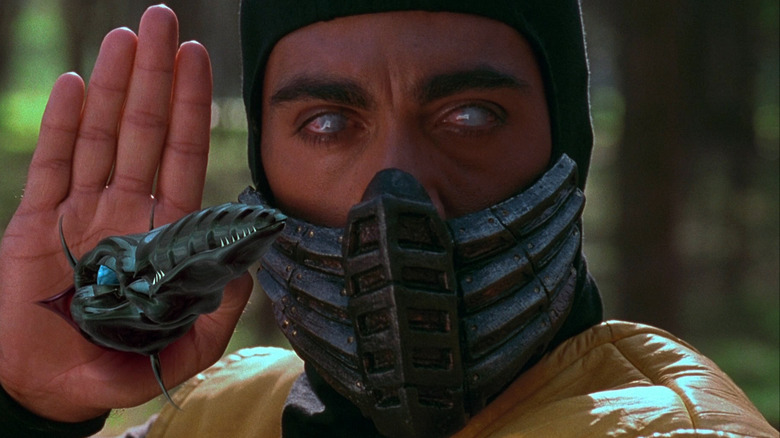Every Live-Action Video Game Movie Ranked Worst To Best
Movies based on video games have gotten a bad rap over the years — and not without just cause. Many video game films are not only bad, but some of the worst films of all time (with most barely passing single digits on Rotten Tomatoes – if that!) This means that deciding which video game movies are the worst of the worst will indeed be very difficult. But we accept the challenge.
To be fair, there have also been some great video game movies released over the years as well. Furthermore, video game movies have gotten a lot more respect lately — both critically and financially (with 2022's "Sonic the Hedgehog 2" setting box office records and earning mostly positive reviews.) So while we'll definitely discuss which films are the worst video game movies ever, we'll also talk about some of the best.
A few things upfront: this list will only consist of video game movies that are a) live-action (sorry, the three of you who liked "Ratchet and Clank" and "Final Fantasy: The Spirits Within"), b) theatrically released (apologies, the zero fans devoted to "Doom: Annihilation"), and c) made in the U.S. — which is already a pretty comprehensive list, all things considered. Unfortunately, this does mean that we won't be discussing great international video game movies, such as Takashi Miike's 2012 "Ace Attorney" film — which, for the record, would definitely be in the top 10 for Ace's hair alone.
42. Alone in the Dark
Uwe Boll is a name that anyone familiar with video game movies will be aware of — and for those who aren't aware, well, we apologize in advance. Boll was a German "filmmaker" (in the broadest of terms), who at one point — up until Paul W.S. Anderson made a fistful of "Resident Evil" films — was the most ubiquitous director around of video game adaptations. He accomplished this feat by getting funding from German tax shelter money that he illegally funneled into his Hollywood productions, and because video game developers didn't really care about their properties as much back then.
It's honestly a toss-up which of Boll's films is actually the worst in his abominable oeuvre, but 2005's "Alone in the Dark" probably "wins" for a variety of reasons. For one, there's the film's general technical incompetence — with made-for-TV cinematography and a CGI creature that looks worse than the early-90's graphics that inspired it. Another is its cliched story that is both overly convoluted and painfully simple at the same time, pretty standard B-movie sci-fi/horror stuff about monsters and the supernatural (which, for some reason, needs a minutes-long text scroll to explain.)
Finally, the movie stars Christian Slater as a down-on-his luck paranormal investigator, with the unkempt stubble and drunken slurred speech of an actor doing the bare minimum for the paycheck, and Tara Reid as a scientist, which you can tell because she (sometimes) wears glasses. Need we say more?
41. House of the Dead
Next up is Uwe Boll's 2003 "House of the Dead" film, based on the popular light gun arcade game from Sega of the same name, which also happens to be the first video game movie Boll ever directed. Where to begin on this cinematic catastrophe?
For some reason, like 2002's "Resident Evil" the year before, the "House of the Dead" movie is a prequel to the actual arcade game. So rather than being about government agents investigating a house full of undead zombies, it instead follows a group of unlikable 40-something college students going to a rave, which is mainly used as an excuse for excessive and gratuitous nudity. They don't even reach the eponymous "House of the Dead" until the very end of the film.
Once the characters show up to the zombie-infested rave, the rest of the movie makes every single wrong creative decision possible. Years-out-of-date "bullet time" action scenes (where the characters change guns mid-scene)? Check. Terrible dialogue, like this exchange between the ostensible hero and villain: "Why do you want to be immortal?" "To live forever!" Check. Splicing in actual footage from the arcade game into the film itself? Check, check, and triple check.
The best you can say about "House of the Dead" is that it hits the requisite amount of minutes to technically count as a feature film.
40. Far Cry
The Uwe Boll-directed "Far Cry" from 2008 is to Boll's oeuvre as "Always" is to Steven Spielberg's, a lesser known and forgotten entry in his filmography. Say what you will about "Alone in the Dark" and "House of the Dead" — people remember them. Not fondly, mind you, but they remember them nonetheless. And that's the first (and last) time anyone will ever compare Uwe Boll to Steven Spielberg.
The film is headlined by actor Til Schweiger, who just a year later would be cast alongside Brad Pitt and Eli Roth (of all people) as fan-favorite Nazi killer Hugo Stiglitz in Quentin Tarantino's World War II action epic "Inglourious Basterds."
The "Far Cry" film itself is based less on the original "Far Cry" PC game from 2004, and more on the sequel that came out a year later for consoles, called "Far Cry: Instinct." Unlike the first game, "Instinct" — as well as the film -– is about a former Spec Ops mercenary (Schweiger) who is sent to a secret tropical island that involves clandestine "Island of Doctor Moreau"-esque mutant experimentation.
What follows is a barely feature-length "action" film, chock-full of badly shot and edited stunt work, terrible make-up effects, and a story so cliché-ridden and bland, it's as if one of those "AI watched thousands of hours of action/sci-fi films and wrote a script" movies actually came into being. Essentially, "Far Cry" refers to the distance the film is from being anything even remotely watchable.
39. Postal
Out of all of the movies in Uwe Boll's undistinguished filmography, it can at least be said that his 2005 comedy-satire "Postal" — based on the raunchy game series from the developer Running Scissors — has a sense of humor about itself. It's a terrible and obnoxious sense of humor full of dated stereotypes, witless gross-out gags, and paper-thin political commentary — but a sense of humor, nonetheless. In fact, it's for that reason that some people give this movie a pass. They're wrong, of course.
That's because for most of its (at this point) characteristically short runtime, the jokes are just not clever at all. In fact, the film seems to simply find it hilarious that someone who is overweight is sexually active, while the sight of actor Verne Troyer (the "Austin Powers" series) getting sexually assaulted by a group of CG monkeys is also meant to be a laugh riot — to give a couple of examples of the type of "humor" on display here.
However, the most depressing thing about this movie is the presence of Dave Foley from "Kids in the Hall" as a bumbling cult leader, who is not only uncharacteristically unfunny, but cajoled into going full-frontal as well. Luckily, Foley's days of starring in Uwe Boll movies are long behind him now, as he is currently starring in the well-received "Kids in the Hall" revival on Amazon Prime Video.
38. BloodRayne
Do you think vampires are cool and sexy? You won't after watching Uwe Boll's 2005 "BloodRayne" adaptation. The game itself wasn't anything really special, but it was a functional and solid third-person action shooter in the vein of "Devil May Cry," which was the style at the time. It was set in the 1930s, right before World War II, with main character Rayne — a tough-as-nails vampire in tight, revealing clothing — fighting off supernatural monsters and Nazis.
Of course, the film is set in the 18th Century, and is yet another example of movies being prequels of the source material, instead of getting adapted from the game's actual story (which will be a sadly recurring theme going forward.) In fact, the star of the film, Kristanna Loken, had already starred in an even earlier video game prequel, the cheesy-but-fun TV series "Mortal Kombat: Conquest."
"BloodRayne" actually has a stacked cast for what it is, with the film also starring Michelle Rodriguez, Michael Madsen, and even Ben Kingsley as the main villain (and at least it's less embarrassing than his role in "What Planet Are You From?") The cast — including Loken as a surprisingly compelling lead — alongside the better-than-average (though still not great) stunt choreography, elevates this film above most of Boll's other video game movie efforts. But that's not saying much, is it?
37. In the Name of the King: A Dungeon Siege Tale
2006's "In the Name of the King: A Dungeon Siege Tale" — based on the popular "Dungeon Siege" series of role-playing games on the PC — is by far the best Uwe Boll-directed video game movie. But that, again, is not saying much. It's the difference between eating dirt as opposed to eating dirt with glass shards in it — one simply goes down easier.
The thing is — in the wake of the success of fantasy films like "The Lord of the Rings," the "Harry Potter" movies, and the first two "Chronicles of Narnia" films — "In the Name of the King: A Dungeon Siege Tale" amassed a much bigger budget from Boll's German tax shelter racket than his previous video game attempts. True, at a reported $65 million, it's not to the scale of the aforementioned blockbusters, but it still allowed for some residual polish that his other films lacked.
Also, it cannot be overstated how fun it is seeing Jason Statham, not even attempting to fit into a fantasy hero mold, beat the hell out of the movie's legion of pseudo-orcs. It's not high art by any means, but when you go into a film called "In the Name of the King: A Dungeon Siege Tale," starring Jason Statham, you know that already.
36. Need for Speed
Despite finding a bunch of success in "Breaking Bad," "The Price is Right." and that one KoRn music video, Aaron Paul never really found a way to parlay any of that into a successful movie career (a fate his co-star Bryan Cranston also faced.) Case in point: 2014's "Need for Speed" adaptation, in which he was the main attraction — behind the car stunts, of course.
As games, the "Need for Speed" franchise was never really about the story, even if they all ostensibly had one. It was mostly about players driving fast cars, performing cool stunts, and enjoying the sweet racing mechanics. However, as a movie, it seems obvious that the impetus for making it was to try and drive on the coattails of the wildly successful "Fast and the Furious" films.
Unfortunately, the "Need for Speed" film never went as crazy as the "Fast and Furious" films did, nor did it have actors who could carry the cliché-ridden, pseudo-cool one-liners (including Paul himself, sadly) the way Vin Diesel or The Rock could. "Need for Speed" honestly needed less speed, and more script polish.
35. Hitman: Agent 47
2007's "Hitman," starring Timothy Olyphant ("The Girl Next Door") as the famously bald assassin and master of disguise, Agent 47, is no great work of art; however, it's a masterpiece in comparison to its "should have been released straight-to-DVD" years-late sequel, 2015's "Hitman: Agent 47." This time, actor Rupert Friend takes on the role from Olyphant. To be fair, Olyphant, an otherwise fine actor, was a bit too baby-faced to really sell Agent 47's toughness (and was adamant that it was simply a paycheck job for him), but he's better than Friend. Not only that, but they couldn't even get Friend to completely shave his head this time!
Both films are based on the "Hitman" series of games, about the aforementioned genetically-altered super-assassin, Agent 47. These games were a classic for a reason, giving players almost infinite possibilities on how to kill their target. Do they go pure stealth? Use disguises (despite being tall, bald, and having a barcode on their neck)? Go in guns blazing? Some mixture of the three? Players had free reign on how they wanted to kill people.
The film, meanwhile, is pretty standard action stuff, with the main issue being just how generic and uninspired it is — which is especially galling when creativity was a big part of the video games' success.
Also, the only real "name" is Zachary Quinto in a villainous role, fresh off "Star Trek." Hopefully he teleported his agent into space after this one.
34. Hitman
As mentioned above, the first "Hitman" film isn't a great, or even good, film. So while better than its terrible sequel, that isn't much of a compliment. The film, in fact, is in some ways less accurate to the games than "Hitman: Agent 47" was, but is overall much more professionally executed.
A lot of this is due to star Timothy Olyphant's charisma as Agent 47, who, while admitting that he took the job to pay for his house at the time, still commits nonetheless. Like Agent 47, he's a darn professional — although originally Vin Diesel was cast in the main role, which does seem like a major missed opportunity.
Agent 47 isn't a really complicated character to begin with, and the story around him is both generic and cliché-ridden, but also extremely convoluted and confusing at the same time. It doesn't help that the movie has a weird and unnecessary framing device where Agent 47 tells the story of the film to an Interpol agent he has taken hostage (played by Dougray Scott of "Ever After").
The direction by French filmmaker Xavier Gens, in his feature debut, doesn't help matters either. It is the victim of the early-2000s action style of filming everything too dark, too close, too shaky, and too quickly-cut.
33. Wing Commander
The making of the 1999 sci-fi action flick "Wing Commander" should have been one of the greatest Hollywood underdog stories of all time. This is because the original creator of the "Wing Commander" PC games, Chris Roberts, got to direct and co-write the story for the feature film version of his own game. This was unheard of at the time, and probably due to the terrible critical and financial reception for "Wing Commander," will probably be unheard of from here on out.
The film stars Freddie Prinze, Jr. and Matthew Lillard — both hot off the hit teen comedy "She's All That," which came out earlier that year — as two hot-shot space pilots, loosely translated from characters in the games. In fact, in the "Wing Commander" games themselves, Prinze, Jr.'s character was played in full-motion video (FMV) cutscenes by Mark Hamill, and Lillard's character was played by actor Tom Wilson (Biff Tannen from "Back to the Future").
Lillard and Prinze, Jr. spend their time in the film piloting badly-rendered early-'90s CG spaceships (which barely rise above the graphical fidelity of the games themselves) against dreaded cat-aliens called the Kilrathi. While the CG itself is bad and amateurish, it's nothing compared to the inarticulate and stiff space-cat puppets, which look like what would happen if Garfield was made out of candle wax.
"Wing Commander" came out right around the time "Star Wars — Episode 1: The Phantom Menace" was arriving, which — despite its current legacy – easily blew "Wing Commander" out of the sky.
32. Max Payne
"Max Payne," the gritty 2008 cop thriller based on the game of the same name, marks the first of two times that Mark Wahlberg will show up in a bad video game movie.
On paper, adapting the admittedly cinematic video game "Max Payne" into a movie makes a certain amount of sense. If the game is already cinematic, it means less work for the film adaptation, correct? The issue, though, is that the story of the "Max Payne" games is more of a pastiche of stereotypical action and cop movie tropes and clichés, rather than a compelling narrative on its own. Which is fine for a video game story — especially at the time — as the appeal was the fact that you got to play as the archetypal "cop on the edge," rather than simply watch it passively.
However, since film isn't an interactive medium, the "Max Payne" movie simply turns into an ouroboros of those same clichés feeding into each other — a reflection of a reflection of a reflection. It eventually just becomes a parody of itself at some point. That's not to mention the shoddy action from John "I directed the worst 'Die Hard' movie" Moore, with nary a bullet time (the thing that the games themselves were famous for), as well as the inclusion of weird, demonic drug trips for some reason. At least Mark Wahlberg is also terrible in it.
31. Resident Evil: The Final Chapter
Surprisingly, one of the most successful — and long-running — video game movie franchises at this point (especially if you count worldwide box office) is the "Resident Evil" series, based on the popular survival horror games from Capcom. The film series began in 2002, ending with the sixth entry, "Resident Evil: The Final Chapter," in 2016. As we'll see below, there have been some really fun entries in this zombie action-horror franchise; most, however, like this one, are unfortunately biohazard-level duds.
The "Resident Evil" film franchise was spearheaded by writer-director Paul W.S. Anderson, who helmed the highly-acclaimed 1995 "Mortal Kombat" film and the underrated sci-fi horror film "Event Horizon" — not to be confused with Paul Thomas Anderson, who has never directed a video game movie (yet).
"The Final Chapter," like all the "Resident Evil" films, follows a character specifically created for the movies named Alice, played by Anderson's wife Milla Jovovich ("The Fifth Element") as she attempts to stop the evil Umbrella Corporation. In the films, like the games, Umbrella created the T-virus that turns people into undead zombies; however, where the films again differ from the source material is the fact that the world is now a post-apocalyptic wasteland (while in the games the monster incidents are usually relatively contained.)
What follows is the worst "Resident Evil" movie in the franchise, with terribly shot and overly-cut action scenes, nonsensical plot twists, and a truly baffling conclusion. At least we still have the games.
30. Resident Evil: Extinction
The next entry on our list is the third "Resident Evil" film, 2007's "Resident Evil: Extinction." It is also the first of three "Resident Evil" entries not directed by Paul W.S. Anderson, with "Extinction" instead helmed by "Highlander" and "The Shadow" director Russell Mulcahy.
The problems with this film start with the premise itself, with an opening crawl and voice-over from Milla Jovovich's Alice talking about how Umbrella's T-virus led to the end of the world. Now, this is not the worst premise in and of itself (though it is derivative), but it is just so out of left field from what happens in the games, as they never, ever went full post-apocalyptic. This is the first "Resident Evil" film to really deviate this much from the source material: the first film was a prequel to the first game (and technically doesn't contradict anything), while the second deviated, but not as much as the rest of the sequels would going forward.
Furthermore, Mulcahy's direction is much less slick than Anderson's, but not compensated with anything else — it's simply just trying to ape the style of the previous films without the finesse. It's a sloppy retread, and it makes sense why Anderson would retake the reins of the series afterward.
At least Linden Ashby (Johnny Cage from "Mortal Kombat") got paid. So that's one positive thing.
29. Resident Evil: Afterlife
The fourth "Resident Evil" film, 2010's "Resident Evil Afterlife," has probably one of the most anti-climatic openings in history, in terms of dashing away any of the potential of the third film's final frames. At the end of the third film, we find out that there's a clone army of Alices, all possessing telekinetic powers to take on the Umbrella Corporation ... then they're all killed in the first scene of "Aftermath." Lame.
This film also came out during the early part of the 3D resurgence that started with James Cameron's "Avatar" a year earlier, so the action in "Resident Evil: Afterlife" is very extreme, with a lot of things coming straight at the camera to make use of those extra dimensions.
Paul W.S. Anderson returned for this installment, after sitting out the previous two, and was one of the few directors at the time to shoot on actual 3D cameras the way James Cameron did, rather than relying on the post-conversion that most 3D films were doing at the time (and, honestly, still do.)
Unfortunately, the story is nonsensical, the villain is laughable, and by this point the films have absolutely no tether to the original "Resident Evil" games, outside of a few characters' names (and even then, they usually have only minimal connections to their namesake). This, of course, isn't necessarily a deal-breaker — it's not like "Resident Evil" games were ever the pinnacle of storytelling — but the problem is that the changes the film made were somehow even worse.
28. Resident Evil: Retribution
2012's "Resident Evil: Retribution" actually starts out strong, and has an interesting sci-fi idea at its core. We open up to Milla Jovovich's Alice with a family in a suburban house, before they are all attacked by zombies. We eventually find out that the suburban neighborhood is just a simulated area in an underground Umbrella facility, which includes other simulated areas such as Tokyo, New York City, and Moscow. Not sure how "Resident Evil" this premise is, but the film series had long abandoned the games' continuity by this point, so why not go crazy with cool sci-fi concepts and unique set pieces while you're at it?
The issue, and why it ranks so low on this list, is that the cool ideas run out pretty quickly, and are only really cool in comparison to the other films' more boring and conventional horror movie set pieces, situated in your standard high-tech labs, rundown city streets, and military bases. Even worse, the last parts of the film actually end up with a mixture of all three. "Retribution" is one of the better "Resident Evil" sequels, but it's still infected by mediocrity nonetheless.
27. Resident Evil: Welcome to Raccoon City
Last year's "Resident Evil: Welcome to Raccoon City" is part of the "grim and gritty" video game movie revival craze Hollywood has insisted on in the last few years, which also includes 2018's "Tomb Raider" starring Alicia Vikander and 2021's "Mortal Kombat." Judging by its placement on this list, "Raccoon City" is also the worst of the bunch ... but, honestly, not by much.
Having said that, there is actually a lot to like about this adaptation on paper. There's the inspired '90s setting (set in 1998, the same year the second game was released), the more accurate storyline (based on an amalgam of the first two "Resident Evil" games, instead of whatever nonsense the other movies became), the focus on characters from the actual game, the more grounded aesthetic, and so on. Even having a plotline that ties the death of Raccoon City to being exploited by Umbrella Corporation's profit-driven greed has a lot of prescient resonance, and could have been really interesting if explored further.
Unfortunately, none of it coalesced into the sum of its parts, and ended up looking like a feature-length fan film despite its best efforts.
26. Silent Hill: Revelation
The 2006 film adaptation of Konami's classic psychological survival horror game "Silent Hill" — directed by "Brotherhood of the Wolf" filmmaker Christophe Gans and starring Sean Bean — is actually one of the best (and arguably the best) video game film adaptation to date. While not a flawless adaptation, Gans' film got the tone, the aesthetics, and the atmosphere of the games across in spades — making it a good movie, period, rather than "good for a video game movie."
Unfortunately, its sequel, "Silent Hill: Revelation," does none of that. Christophe Gans does not return to direct, the duties instead falling on director M. J. Bassett, who mostly works in television now. Bean, meanwhile, does (briefly) return — in one of the few roles he survives in (despite his video game counterpart getting killed). The rest of the cast is rounded out by lead actress Adelaide Clemens (TV's "Rectify"), Carrie-Anne Moss in her post-"Matrix" lull, and Kit Harington ("Game of Thrones," and to a lesser extent, "Eternals").
Everything in "Silent Hill: Revelation" is worse when compared to the original film — it's less accurate to the games, it's less scary, it's less stylish, and it's less expensive-looking. Like the eponymous town itself, avoid "Silent Hill: Revelation" at all costs.
25. Street Fighter: The Legend of Chun-Li
After the success of Christopher Nolan's gritty reboot of "Batman Begins" in 2005 — a rebuke of previous director Joel Schumacher's flamboyant, colorful, and purposely campy "Batman and Robin" — it led to a boon of "gritty reboots" that lasted for years afterward, such as 2006's "Casino Royale," 2012's "Snow White and the Huntsman," and even the aforementioned and more recent "Resident Evil: Welcome to Raccoon City," among others.
However, the trend was by far most prevalent in the early-to-mid-'00's, right when talks of a "Street Fighter" reboot began. In a bid to separate itself from the colorful, campy, and cartoony Jean-Claude Van Damme-led "Street Fighter" film from 1994, 2009's "Street Fighter: The Legend of Chun-Li" instead decided to go the "grounded and gritty" reboot route. Everything is now shot with a bland gray color palette, M. Bison is just some guy in a business suit, and Chun-Li wears (a bad version of) her video game outfit for just one quick scene.
In addition, the fight scenes are boring (and surprisingly few and far between), while also containing a sparse selection of classic "Street Fighter" characters. Besides the aforementioned Bison and Chun-Li, we mostly just get extended scenes with Charlie Nash, no one's favorite "Street Fighter" character (and who doesn't even get the Guile connection that made the video game version interesting at all). Basically, this one was a TKO all around.
24. Tekken
What do players find cool about Namco's 3D fighting game series, "Tekken"? Is it the bonkers characters, which include a robot ninja, a sentient tree, two different bears, and a freakin' dinosaur? Is it the colorful and varied backgrounds? Or, finally, is it the interesting and compelling (if a bit campy and goofy) backstory involving Shakespearean generational drama, as well as a story about corporations harvesting demon blood to make half-demon super fighters? Or is it all of the above?
The problem with the 2010 live-action adaptation is that it contains almost none of that. Sure, there are a few elements adapted relatively accurately (Yoshibitsu, the aforementioned robot ninja, is surprisingly a highlight of the film — but even he doesn't get his patented glowing green lightsaber). However, the rest of the film turns the over-the-top aesthetics of the game into a very staid and boring MMA-inspired tournament, with just as equally uninspired fight choreography.
The only reason why the "Tekken" film isn't rated even lower, is that it perfectly casts legendary actor Cary-Hiroyuki Tagawa as the villainous Heihachi Mishima, who — like he did as Shang Tsung in the 1995 "Mortal Kombat" film — steals every scene he's in. But aside from that, the "Tekken" film is a major dud. The movie doesn't even have King, the tiger-headed wrestler with sneakers, in it.
23. Mortal Kombat (2021)
The "Mortal Kombat" reboot from 2021 is one of the worst reboots in recent memory. The "Mortal Kombat" video games — as well as the previous film adaptations — were fun and imaginative, with ninjas who fought cyborgs who fought cyborg ninjas who fought monsters who fought monster ninjas and everything in between...including even cowboy ninjas at this point.
The 2021 film, however, was instead very dour and self-serious. Worse, its fight scenes — the entire raison d'etre of a "Mortal Kombat" film — were lackluster. The actors and stunt team seemed to be working hard, but were let down by the shoddy camera work and terrible rapid-fire editing. Even the R-rated bloody mayhem didn't help liven things up, especially with how quick and badly-CGI'd they were.
Not only that, but the main character, Cole Young (played by Lewis Tan) — created specifically for the film – was wholly unnecessary. He was written to be a dreaded "audience surrogate" for other characters to explain the universe to, but his inclusion only confuses the story. What role does Liu Kang have now that he's not the hero? What role will Johnny Cage have if not the audience surrogate? The '95 movie didn't need to create a character for the plot to make sense, so why would audiences need one in 2022? Even if that was necessary for new audiences, why does Cole have to be so bland and boring? This movie definitely deserves a Fatality.
22. Monster Hunter
Before Paul W.S. Anderson became embroiled in all the later "Resident Evil" sequels, he was known as a sort of anti-Uwe Boll, by directing arguably the best video game movie to date with 1995's "Mortal Kombat" (not to be confused with the dreadful previous entry), and the fun (if flawed) first "Resident Evil" film.
However, that title probably has to be revoked after "Monster Hunter," once again starring his wife Milla Jovovich, who controversially led the "Resident Evil" film franchise as the non-video game character Alice.
Capcom's "Monster Hunter" series actually lends itself well to a cinematic story. It could have been a coming-of-age film about a nascent hunter of monsters, who through trials and tribulations takes down a big, scary creature at the climax of the film. The filmmakers could have even brought a personal element to it by having the monster destroy the hunter's village, or something.
Instead it's an uncomfortably jingoistic "US soldier gets transported to the 'Monster Hunter' world" plot, which is really insulting to the audience, as modern filmgoers don't need audience surrogates to dump exposition about fantasy worlds anymore. Plus the movie already has a monster hunter styled directly from the games, played by Tony Jaa, that makes Jovovich's character superfluous. The film should have either focused entirely on Jaa, or make Jovovich the titular monster hunter — trying to do both was narratively messy and wholly unnecessary.
21. Assassin's Creed
It's disappointing that the "Assassin's Creed" movie — based on the extremely popular third-person action-adventure game from Ubisoft — is ranked so low, considering how much money, effort, and talent was put into it. In fact, the director, Justin Kurzel, was behind the critically-acclaimed 2015 adaptation of "Macbeth," which contained powerhouse performances from stars Michael Fassbender ("X-Men: First Class") and Marion Cotillard ("The Dark Knight Rises"), who both returned for Kurzel's "Assassin Creed" adaptation. They were joined by other prominent A-list actors, such as Brendan Gleeson ("Paddington 2"), Jeremy Irons ("Dungeons and Dragons"), and the late, great Michael K. Williams (HBO's "The Wire").
"Assassin's Creed" also apparently boasts a world-record-breaking stunt: the longest free fall ever filmed, for the patented "Leap of Faith" scene, with stuntman Damien Walters falling 125 feet into an inflatable mat (which, to be fair, is much softer than the bale of hay from the games).
Unfortunately, for all Kurzel's talents as a director, he isn't great with action. He falls into the same trap a lot of the films on this list do, by filming the fights too close, lighting them too dark, and editing them too fast. "Assassin's Creed" also makes the same mistake the original "Resident Evil" films and the "Mortal Kombat" remake did by following a boring main character made specifically for the film, rather than a fan-favorite (like Ezio) from the games.
20. Tomb Raider (2018)
The 2018 "Tomb Raider" reboot, starring Alicia Vikander from "Ex Machina," isn't the worst movie in the world — but it might be the most "meh" movie in the world. Because the film honestly doesn't do anything wrong, per se; however, it doesn't excel at anything either. It's the ultimate "C-average" movie, which is why it's towards the middle of the list.
For instance, Alicia Vikander — who is a great actress, turning in revelatory performances in "The Green Knight" and the aforementioned "Ex Machina" — does indeed make a competent Lara Croft. Vikander looks the part (especially the rebooted version), acquits herself well to the stunts, and is affable enough as a tough protagonist. Having said all that, she also doesn't make much of an impression, especially in comparison to what Angelina Jolie did with the same part almost two decades prior.
The film is also overly sedate, too darkly-shot, and an overall pale comparison to the "Tomb Raider" remake games. For instance, it makes sense that the film doesn't have a bunch of violent, gory death scenes with Vikander's Croft bashing bloodily into rocks or impaled by trees ... but at least that would bring some liveliness to this bland remake.
When your most energetically-directed "action" scene is a freaking bike chase among co-workers, you've messed up big time.
19. Doom
"Doom," the 1993 action-horror first-person shooter from id Software, is a classic for a reason. While not the first ever first-person shooter developed (in fact, not even the first one made by id Software), "Doom" is nonetheless the game that put the genre on the map. A big part of its success was its undeniable style, mixing gritty sci-fi aesthetics with cool "Dungeons and Dragons"-inspired demon enemy designs.
In fact, the original intent was to make an "Aliens" video game, but once id Software couldn't obtain the license, the development team decided to create an original game about demons being summoned into a Martian space station instead.
So the film not making the enemies actual demons — or making any references to hell or Satan — and focusing instead on some weird alien virus is the first of many mistakes that the 2005 "Doom" film, starring Dwayne "The Rock" Johnson and Karl "Dredd" Urban, makes. In fact, the film's main claim to fame — the overrated first-person scene — is actually, in retrospect, extremely terrible and dated, and honestly the worst part of the movie. And that's saying a lot.
18. Prince of Persia: The Sands of Time
There are surprisingly a lot of things to like in 2010's "Prince of Persia: The Sands of Time," one of the first real attempts at an actual, big-budget, blockbuster video game adaptation since "Super Mario Bros." and "Street Fighter" almost two decades prior. Even then, "Prince of Persia" was going way beyond those two in terms of scale and budget, and was instead attempting to be the next "Pirates of the Caribbean" mega franchise — especially considering the involvement of super-producer Jerry Bruckheimer and "Harry Potter and The Goblet of Fire" director Mike Newell.
The film also boasts an all-star, A-list cast, which includes Jake Gyllenhaal ("Donnie Darko"), Alfred Molina ("Spider-Man: No Way Home"), Gemma Arterton ("The King's Man"), and Oscar-winner Ben Kingsley (though he also did previous entry "BloodRayne").
Whatever the film does right, however, it can't overcome its initial sin of the extremely white-washed casting — which goes from distracting to outright insulting immediately. This is especially galling in the year 2010, and even more so when it was shown how much more successful "Aladdin" — with more race-appropriate casting — was for Disney years later. The film also isn't helped by the fact that, while there are indeed some fun set pieces, it's also kind of a paint-by-numbers adventure film plot. There's also a chemistry-free romance at the center of it, which probably wouldn't have lent itself to a franchise anyway, appropriate casting or not.
17. Tomb Raider: The Cradle of Life
Most people don't even remember that there were actually two Angelina Jolie-led "Tomb Raider" movies, even though the first film was one of the top-grossing films of 2001. Unfortunately, the sequel, "Tomb Raider: Cradle of Life," wasn't as lucky.
Not from a lack of trying though: the director was the esteemed action filmmaker Jan de Bont ("Speed"), who does direct some cool action sequences in the film. This includes a fun scene where Jolie, as Lara Croft, punches a CG shark in the nose. It's goofy and ridiculous ... but then again, so were the games at the time.
The "Tomb Raider" sequel is also somewhat elevated by the performance of Gerald Butler ("300") as the ostensible love interest of the film. While handsome and dashing as always, his character also has a dark edge to him, so you never really know if he's on Lara's side or not until the end. That's a hard balancing act to tread — especially in such a by-the-numbers adventure film like this — so kudos to Butler for pulling that off, if nothing else.
However, "Cradle of Life" doesn't ever really rise above mediocrity. It's also way too focused on being the early 2000s' version of "slick and cool," turning into more of a modern spy film with Lara raiding corporate skyscrapers instead of tombs, and no longer the classic adventure story that the better games and the first film were.
16. Uncharted
The extremely cinematic action-adventure game series "Uncharted," from developers Naughty Dog, just received a big-budget feature film adaptation in 2021. It starred Tom Holland ("Spider-Man: No Way Home"), of all people. as the roguish protagonist Nathan Drake — which, of course, means this is yet another case of the filmmakers deciding to do a prequel instead of a story based on the games themselves. It's especially galling when Nathan Fillion is right there, and even starred in a superior fan film years before.
Also, once again, Marky "Max Payne" Mark shows up as Sully, after aging out of the Nathan Drake role during the film's long, tumultuous development. Sully's iconic mustache even gets an MCU-esque reveal.
Now, the film itself is fun enough. It has some moderately exciting action set pieces, including a recreation of the cargo plane sequence from the "Uncharted 3" game, as well as an interesting climax on top of a helicopter-lifted pirate galleon. Antonio Banderas also plays a captivating antagonist, despite how underwritten the role is.
However, like "Max Payne" before it, the appeal of "Uncharted" is that you get to play through an interactive adventure story yourself, where the tropes and clichés are less of an impediment. Take the interactivity away, and the film itself can't help but feel a bit too derivative for its own good.
15. Double Dragon
The 1994 action-comedy film "Double Dragon" is based on the 1987 arcade game of the same name, about two brothers who have to save one of their kidnapped girlfriends from a gang of thugs.
The film, however, is instead about finding a long-lost, mystical medallion in a post-apocalyptic Los Angeles (or "New Angeles") for some reason. It stars Mark Dacascos ("Agents of SHIELD") and Scott Wolf (TV's "Party of Five") as the two main brothers, while the underrated Robert Patrick ("Terminator 2: Judgment Day") plays a bleach-haired villain with shadow powers, who doesn't seem to have a video game counterpart.
To be fair, there are certainly a few elements cribbed from the game. This includes classic enemies like Bo Abobo, the magical medallion eventually giving Dudicoff and Wolf a version of their red-and-blue video game outfits, and even a reference to the game's twist ending. However, despite that, the movie is still pretty terrible, with lame, childish humor, bad special effects, and a generic adventure story.
The only reason it isn't ranked worse is that it's too fun, colorful, and goofy in a specific early-'90s way to completely hate. It's not a good movie by any means, but it at least has the courtesy to not be a self-serious bore like a lot of the worst video game movies tend to be.
14. Rampage
2018's "Rampage" is based on the popular Midway arcade game from 1986 where gamers played as off-brand — and, thus, not copyright-infringing — versions of King Kong, Godzilla, and The Wolfman (George, Lizzy, and Ralph, respectively). The game involved the kaiju characters tearing across the country, demolishing buildings, fighting the military, eating people, and sometimes punching their fellow monsters out.
While the film is only loosely based on the game, it is also surprisingly better than would seem possible at first glance. It stars Dwayne "The Rock" Johnson as a no-nonsense zookeeper with an (obviously) secret military past, joining the adventure to protect his ape friend George from the military and other monsters. Luckily, the wrestler-turned-actor is fun and charismatic, as always (well, except when he starred in that dismal "Doom" movie).
Also, the giant monster action and destruction — the main attraction of both the games and film — are well-done for the most part, despite some shoddy CG and compositing here and there. The film's also pretty reminiscent of the games in some key ways, including a clever recreation of art from the arcade cabinet of George the Ape capturing a blonde woman in a red dress, played by Malin Akerman (2009's "Watchmen").
Sadly, when monsters are defeated they don't turn into naked humans for the other monsters to eat for health, and are instead just genetically-altered animals. Which is definitely less fun.
13. DOA: Dead or Alive
For all the many faults the 2005 "DOA: Dead or Alive" movie possesses, it's also pretty much what you'd want a "DOA" movie to be. Based on the literally titillating 3D fighting games from Tecmo and Team Ninja, the film adaptation — like the games — is goofy and campy, and contains lots of attractive girls, as well as hot buff guys, wearing almost nothing at all while fighting. That's not necessary a recipe for great cinema, but there's admittedly a ceiling on what the quality of a "DOA" movie can be. You're not exactly going to get a nuanced treatise on the nature of man, nor is that really what you'd want from it.
Of course, this film is not to be confused with the classic noir "D.O.A.," nor the '80s remake helmed by "Super Mario Bros." directors Annabel Jankel and Rocky Morton.
What the film does offer is well-choreographed wire-fu fight scenes from "The Transporter" director Corey Yuen, game-accurate costumes, and a light tone that doesn't take itself too seriously (unlike most of the fighting game adaptations we've mentioned so far.)
The problem, of course, is that while entertaining, "DOA" is admittedly as shallow as a deflated kiddie pool. It's story makes very little sense (something involving magical sunglasses?), and the characters are all pretty one-dimensional. But if you're able to look past all that, and just enjoy the fights and pretty colors, there are certainly worse ways to spend your time.
12. Mortal Kombat; Annihilation
1995's "Mortal Kombat" was a surprise hit and even got mixed-to-positive reviews upon release, including a thumbs-up from Gene Siskel. This meant that a sequel was fast-tracked to hit while the iron was hot, as well as coincide with the release of the "Mortal Kombat 4" and "Mortal Kombat: Mythologies: Sub-Zero" games, which were both coming out at the same time.
Director Paul W.S. Anderson didn't want to return for the sequel, due to the tight schedule and wanting to work on "Event Horizon," so first-time director (and the first film's director of photography) John R. Leonetti took on the role instead. A lot of the cast also refused to come back as well, with only Robin Shou as Liu Kang and Talisa Soto as Kitana returning from the first film.
The most baffling aspect of "Mortal Kombat: Annihilation" was that while it reportedly cost $30 million ($10-12 million more than the first "Mortal Kombat"), the cheap production values makes it look like it cost half. For instance, Shao Kahn's skull mask looks like it has a "Simpsons"-esque overbite, while all the CGI looks unfinished. Worse, the acting is atrocious, particularly Brian Thompson's portrayal of the villainous Shao Kahn, which comes across as whiny and petulant rather than dangerous and imposing.
However, "Mortal Kombat: Annihilation" isn't all bad. It has many fun nods to the games, a great '90s soundtrack, and the fight scenes were well-choreographed for the most part. Also, at least there's no Cole Young.
11. Warcraft
After director Duncan Jones' stellar sci-fi debut "Moon," followed by the fun Jake Gyllenhaal-led time loop action-thriller "Source Code," the filmmaker was hired to helm the big-budget, blockbuster "Warcraft" film. While Jones had gained critical success with his first two films, fans were excited that he was a huge "Warcraft" fan, with the trailers promising game-accurate armor and character designs. This was after Sam Raimi eventually dropped out following a long development period.
While the film doesn't really work, it's not from lack of trying. "Warcraft" is epic and ambitious, pushing mo-cap technology to its limit at the time. Toby Kebbell, as the orc protagonist Durotan, especially gives a layered and standout performance underneath the CG.
The film is also surprisingly morally ambiguous and nuanced, showing heroes on both the orc and human sides trying to stop the titular war between the races. The movie even ends on a tragic note, a rarity for a four-quadrant blockbuster.
The main issue with "Warcraft" is its overly-expository and clunky script, which feels both languid and rushed at the same time. Also the VFX, especially for the CG orcs, is wildly inconsistent — photo-realistic in moments, and bad PlayStation 1 in others.
"Warcraft" is basically a noble attempt by Duncan Jones to create a truly epic, complex "Warcraft" film — it's just mired by its uneven, if sporadically inspired, execution.
10. Resident Evil: Apocalypse
There is a lot wrong with 2004's "Resident Evil: Apocalypse," the second in the series. It's one of the only original "Resident Evil" movies (along with "Resident Evil: Extinction") not helmed by Paul W.S. Anderson, and is instead directed by former second unit director Alexander Witt as his feature debut. He had previously worked as a second unit director on such action films as "Speed," "Gladiator," and "Prince of Persia: The Sands of Time."
A lot of the problems from the latter "Resident Evil" sequels still exist in "Resident Evil: Apocalypse." The film focuses too much on Milla Jovovich's Alice, the action is reminiscent of a lot of the post-"Matrix" wannabe wire-fu stuff from the early-to-mid 2000s, and the deviations from the games' lore can be grating. But at least the characters introduced from the video games are mostly accurate to their digital counterparts, with Sienna Guillory playing a game-accurate Jill Valentine (down to her "Resident Evil 2" costume), as well as the inclusion of the fan-favorite monster Nemesis from the "Resident Evil 3" game (who was teased at the end of the first "Resident Evil" movie).
Honestly, the goofy (but also mostly games-accurate) Nemesis costume alone puts "Resident Evil: Apocalypse" above the other, lesser sequels — especially the fun scene where he accurately shoots a bunch of S.T.A.R.S. members with a mini-gun, while somehow managing not to hit anyone else. It's not great or anything, but it's something.
9. Sonic the Hedgehog
Sonic the Hedgehog was the supposedly "cooler" and "edgier" video game mascot for the nascent SEGA Genesis console, the main competition to the dominant Super Nintendo Entertainment System and its more cuddly mascot, Mario. From the very beginning, Sonic was always running behind Mario in terms of popularity (despite his super speed).
However, Sonic is actually ahead of Mario when it comes to successful films, particularly in terms of box-office receipts and critical reception. This is helped by the fact that "Sonic the Hedgehog" is actually pretty close to his video game counterpart, with comedian Ben Schwartz doing a great job as the energetic voice of the heroic blue hedgehog. That famously wasn't always the case, as fans initially revolted and forced Paramount to push the release date back to completely redesign the main character.
Jim Carrey also puts in a great performance, a welcome throwback to his manic comedic persona from the '90s after many years of doing dour dramas like "The Number 23" and "Dark Crimes."
The film isn't ranked higher, however, because while it opens strong with a young Sonic running around a recreation of the first game's level, it immediately takes a downturn when he's sent to Earth to befriend a cop (played by an affable James Marsden). It's an extremely hackneyed, lazy narrative choice that — despite some fun scenes and an admittedly exciting climax — the film never fully overcomes.
8. Lara Croft: Tomb Raider
The least you can say about 2001's "Lara Croft: Tomb Raider" — based on the popular third-person action game from Eidos Entertainment — is that it is perfectly cast. Star Angelina Jolie was probably the only human being at the time who could possibly portray the unrealistically voluptuous '90s version of Croft from the original games (who even had her own magazine spreads), without coming off as a bad parody. Her British accent wasn't bad either.
The rest of the film, directed by Simon West ("Con Air"), isn't terrible by any stretch, but unfortunately, it also isn't anything special, either. There's a fun action sequence with a training robot at the beginning (heavily teased in the film's marketing), but a lot of the action sequences are both overly stylized in that patented early-2000s way, as well as greatly derivative of other, better, adventure films.
None of this is a huge problem in and of itself, and Jolie's undeniable charisma buoys a lot of the film's inherent flaws, but it's not enough to make the film rise above "okay." It also doesn't help that other characters call her a "tomb raider" at least a bajillion times before the end credits roll.
7. Super Mario Bros.
The "Super Mario Bros." movie was Hollywood's first real attempt at producing a big-budget feature film out of an existing video game property. "Super Mario Bros." seemed like the perfect fit as Mario was deemed more recognizable at the time than Disney's Mickey Mouse.
The production, unfortunately, was a disaster. Stars dropped out and/or got drunk to get through the day, the script was being hastily rewritten on set, it went overbudget, and the directors were fired. So the "Super Mario Bros." movie had a lot to overcome before it even hit theaters. Unfortunately, the film was a massive critical and commercial failure, and was considered by many cast members to be the worst film they had ever been a part of.
But is the film really that bad? Well, it depends. As an adaptation of the "Super Mario Bros." game, most definitely. Instead of being a family-friendly fantasy adventure, the directors (and former married couple) Annabel Jankel and Rocky Morton decided that they'd turn "Super Mario Bros." into an edgy dystopian cyberpunk thriller for some reason. They even hired the art director of "Blade Runner" as the production designer!
However, as a film itself, it's not too bad. Its plot about dinosaurs evolving in a parallel universe is interesting, its anti-capitalist themes are extremely prescient, and the great performances from the main cast (especially Hoskins as Mario Mario, despite his hatred for the film) elevate it from being a complete Game Over.
6. Resident Evil
As mentioned in the previous "Resident Evil" entries, players definitely have a lot of valid critiques about the liberties the film series took with the established "Resident Evil" game canon. Most of those grievances have to do with the films following Milla Jovovich's Alice, rather than already established characters from the games like Jill Valentine, Claire Redfield, or Leon Kennedy. Those characters do eventually make appearances in the "Resident Evil" films, but, as also mentioned before, they rarely resemble their video game counterparts outside of their names and costumes.
But just as "The Shining" is a great movie, despite being a terrible adaptation (in terms of fidelity to the source), then perhaps we can cut the first "Resident Evil" movie from 2002 some slack. Because, if we look past the liberties the film takes in adapting the game, we still have a fun, slick action-horror movie with a cool soundtrack, some gory kills, and even a few surprising jump scares for good measure.
Also, unlike the later sequels, the first "Resident Evil" is a prequel, which — while an alarmingly common, and unwelcome, occurrence in these various video game adaptations — at least means that it doesn't contradict the game's continuity in a drastic way.
Not to mention, it's pretty cool when Alice jump-kicked that zombie dog in the face, right?
5. Street Fighter
The "Street Fighter 2" arcade game from Capcom was a phenomenon when it was first released. The characters were colorful and unique, their special moves were awesome-looking, and a glitch allowed for the birth of the series' patented combo system.
So it makes sense that Capcom would capitalize on its popularity with a feature film. They eventually cast Belgian action star Jean-Claude Van Damme as the all-American Guile, never even trying to hide his thick accent. Sadly, they also turned Guile into the film's protagonist, shifting the video games' actual protagonists Ryu and Ken into side characters (although at least they showed up, unlike in "Legend of Chun-Li"). Worse, due to scheduling issues, the cast didn't have any time to rehearse their fight scenes, which is the whole reason to make a "Street Fighter" movie in the first place.
But it isn't all bad. Acclaimed actor Raul Julia was cast as the villainous M. Bison — in sadly his last role — and has an absolute blast. He chews through the scenery like a ravenous wood chipper, and his line reading of "For me, it was Tuesday" is the thing of legend. He elevates the entire film through sheer charisma alone.
Also, despite all its flaws, the film is just too goofy and earnest to actively hate. If you treat it like a big-budget, live-action Saturday morning cartoon, it's actually a lot of fun.
4. Detective Pikachu
When people think of "Pokémon," the 2016 Nintendo 3DS mystery-adventure side game "Detective Pikachu" isn't the first thing that comes to mind for most of them. However, despite that, the "Detective Pikachu" film adaptation that came out a few years later is, against all odds, actually pretty good.
One of the main reasons for its success, of course, is the cute, cuddly yellow rodent at the center of it. Not only is Pikachu lovingly rendered in state-of-the-art CG, but Ryan Reynolds is also well-suited for the role of the coffee-chugging, button-nosed detective.
The designs for all the live-action Pokémon in the film are generally great as well. They perfectly toe the line between fidelity to the games and the necessities of making them fit into a photo-realistic live-action world. It's flawless, and evokes the same kind of awe "Who Framed Roger Rabbit?" did decades earlier.
The mystery at the center of the story is well-told, and even somewhat shocking for what it is. It's not going to make many adults scratch their heads in confusion, but it is a good "baby's first noir" film that doesn't insult anyone's intelligence. There's a strong emotional core to the film as well. Actor Justice Smith plays a wannabe Pokémon trainer, who is stuck in a dead-end job and trying to come to terms with the disappearance of his father — which Detective Pikachu holds the key to. While not the most original conflict, it is still effective nonetheless.
3. Sonic the Hedgehog 2
As mentioned above, 2020's "Sonic the Hedgehog" was a generic kid's film, stopped from being much worse by an accurate portrayal of Sonic and a fun '90s-era Jim Carrey performance, even if it never rises to the level of "good."
However, against all odds, the filmmakers actually listened to the criticisms of the first film, and seemingly fixed every issue to make an almost ideal sequel — although nostalgia-goggles might play a large part in many fans' affection for "Sonic the Hedgehog 2."
For one, Jim Carrey's Dr. Robotnik actually looks like Dr. Robotnik this time (teased in an after-credits sequence from the first film), and is even funnier and more unhinged to boot.
We also finally see Sonic and his double-tailed fox sidekick Miles "Tails" Prower team up (another quick tease from the first film), which is even better if you know that the actress who voiced Tails in the recent games, Colleen O'Shaughnessey, was cast in the film as well. Not only that, but Idris Elba kills it as a tough-as-nails (if a bit dimwitted) Knuckles, with a performance that effortlessly toes the line between intimidating, comedic, and heartwarming.
Even better, they sideline most of the human characters (save for a baffling wedding subplot, one of the few weak points of the film) for most of the runtime, letting the audience hang out with the characters they actually paid to see.
2. Silent Hill
Konami's "Silent Hill" series is one of the premiere horror franchises in gaming history — or of any medium, really. "Silent Hill 2," for instance, frankly surpasses many horror films in terms of its scares, tension, and even emotional resonance. So a live-action "Silent Hill" film adaptation has a lot to live up to. Luckily, director Christophe Gans and co-writer Robert Avery actually pull it off.
Aesthetically, it looks exactly like the games — from the atmospheric, foggy landscapes, to the dingy, rundown locations, to the gruesome and horrifying creatures. The creature designs are especially impressive, as they utilized very little CG to create, opting instead to use practical make-up effects whenever possible.
The acting is also great. It stars Australian actress Radha Mitchell ("Pitch Black") as the mother searching for her child in the haunted town of "Silent Hill," and Sean Bean as the equivalent of the game's Harry Mason (who in this version is named Christopher Da Silva, and who also doesn't go to Silent Hill). Even the child actress, Jodelle Ferland, does a great job with a challenging, nuanced role.
Furthermore, the changes the film makes to the game's plot ultimately fit the story they're telling (such as gender-flipping the parent character, and making the normally villainous Delilah more sympathetic), but, more importantly, those changes don't take away the essence of the games at all. The film is still a terrifying horror story, and an effective one at that. And, hey, it wasn't a prequel.
1. Mortal Kombat (1995)
We've come to it at last: The best video game movie of all time is "Mortal Kombat" from 1995, helmed by "Resident Evil" and "Monster Hunter" director Paul W.S. Anderson.
There are many reasons why "Mortal Kombat" is still the best video game movie ever made, even to this day. First, like all the best adaptations, it understood the — for lack of a better term — soul of the original video games. Similar to the games, the "Mortal Kombat" film is fun, goofy, a little campy, with cool characters, killer fight scenes, and awesome creature designs.
It also doesn't try to re-invent the wheel, like the misbegotten 2021 reboot does. The first game's story is essentially "Enter the Dragon" with actual half-dragon monsters, so the "Mortal Kombat" film does it justice by sticking to that formula. Even changes that are made — like Liu Kang initially running away from his destiny — make sense for the film, as it gives Liu a conflict to overcome.
Finally, the cast is perfect. Robin Shou is a solid leading man as Liu Kang, Linden Ashby is hilarious as the cocky Johnny Cage, Bridgette Wilson is convincingly tough as Sonya Blade (even doing her own stunts), Christopher Lambert brings welcome levity to Lord Raiden, and Cary-Hiroyuki Tagawa is terrifying as the evil sorcerer Shang Tsung. "Mortal Kombat" wins.
